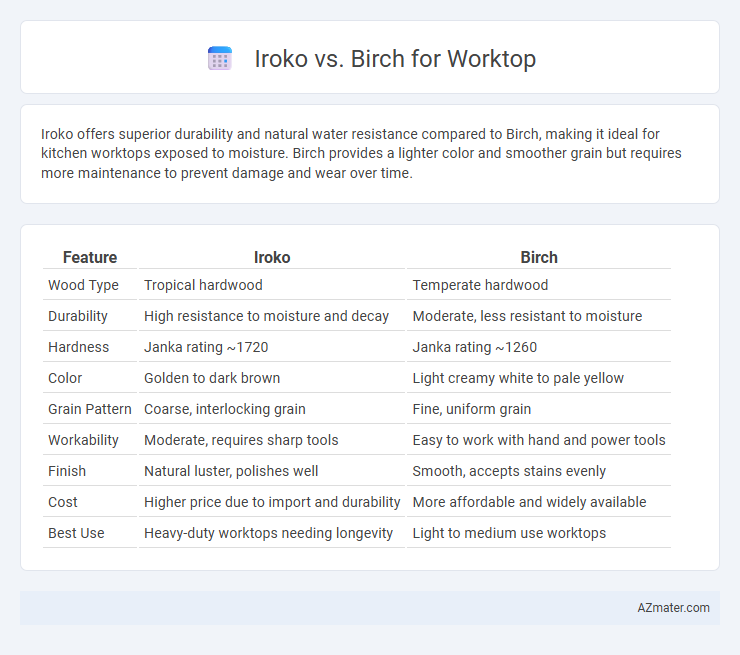Iroko offers superior durability and natural water resistance compared to Birch, making it ideal for kitchen worktops exposed to moisture. Birch provides a lighter color and smoother grain but requires more maintenance to prevent damage and wear over time.
Table of Comparison
| Feature | Iroko | Birch |
|---|---|---|
| Wood Type | Tropical hardwood | Temperate hardwood |
| Durability | High resistance to moisture and decay | Moderate, less resistant to moisture |
| Hardness | Janka rating ~1720 | Janka rating ~1260 |
| Color | Golden to dark brown | Light creamy white to pale yellow |
| Grain Pattern | Coarse, interlocking grain | Fine, uniform grain |
| Workability | Moderate, requires sharp tools | Easy to work with hand and power tools |
| Finish | Natural luster, polishes well | Smooth, accepts stains evenly |
| Cost | Higher price due to import and durability | More affordable and widely available |
| Best Use | Heavy-duty worktops needing longevity | Light to medium use worktops |
Introduction to Iroko and Birch Worktops
Iroko worktops, sourced from the resilient African iroko tree, are prized for their durability, water resistance, and rich golden-brown hue that darkens with age, making them ideal for high-traffic kitchen areas. Birch worktops come from the pale, smooth-grained birch tree, offering a lighter, more contemporary aesthetic with moderate hardness and good shock resistance, suitable for modern kitchen designs. Both materials provide unique textures and strengths, with iroko favored for longevity and birch chosen for its clean, bright appearance.
Appearance and Aesthetic Qualities
Iroko worktops feature a warm golden to medium brown hue with interlocking grain patterns that develop a rich patina over time, offering a luxurious and tropical aesthetic. Birch worktops showcase a pale, creamy color with a smooth and uniform grain, providing a clean, contemporary look that brightens kitchen spaces. Both woods bring unique visual appeal: Iroko lends depth and character, while Birch delivers minimalist elegance suited for modern interiors.
Durability and Hardness Comparison
Iroko wood exhibits higher durability and resistance to wear, making it ideal for heavy-use worktops in kitchens and workshops. Birch, while moderately hard with a Janka rating of around 1260, is softer than Iroko, which registers approximately 1720 on the Janka hardness scale, resulting in greater susceptibility to dents and scratches. Iroko's dense grain structure and natural oils provide superior hardness and moisture resistance, enhancing its longevity in worktop applications.
Maintenance and Care Requirements
Iroko wood requires regular oiling to maintain its natural oils and prevent drying, making it moderately high-maintenance compared to birch. Birch worktops need less frequent sealing but are more prone to dents and stains, requiring careful cleaning and prompt spill management. Both woods benefit from gentle soap and water cleaning, avoiding harsh chemicals to preserve their surface integrity.
Cost and Budget Considerations
Iroko worktops typically cost more than birch due to their durability and resistance to moisture, making them a long-term investment for kitchens with heavy use. Birch worktops offer an affordable option with a warm, light aesthetic but may require more maintenance and treatment to prevent damage over time. Budget-conscious buyers often choose birch for its lower initial price, while those prioritizing longevity may opt for the higher upfront cost of Iroko.
Environmental Impact and Sustainability
Iroko worktops, sourced from West African forests, offer moderate sustainability due to responsible forestry certifications like FSC, though concerns remain about illegal logging in some regions. Birch, typically harvested from fast-growing, renewable temperate forests in Europe or North America, provides a more eco-friendly option with efficient growth cycles and widespread sustainable management practices. Choosing birch reduces carbon footprint and supports sustainable forestry initiatives, whereas iroko's environmental impact varies based on source and certification.
Suitability for Different Kitchen Styles
Iroko wood, with its rich golden-brown hues and natural durability, suits rustic, traditional, and tropical kitchen styles, offering a warm and inviting aesthetic. Birch, characterized by its pale, fine-grained appearance, complements modern, Scandinavian, and minimalist kitchens by providing a clean and airy look. Both woods are durable for worktops, but Iroko's moisture resistance makes it ideal for high-traffic kitchens, while Birch's smooth finish enhances contemporary design themes.
Installation and Workability
Iroko wood offers easier workability for worktops due to its stable grain and moderate hardness, allowing smoother cutting and shaping during installation. Birch, while harder and more prone to splintering, demands more precise tools and technique, making its installation slightly more challenging and time-consuming. Both woods provide durable surfaces, but Iroko's natural oils enhance resistance to moisture, reducing the risk of warping compared to birch during worktop installation.
Long-Term Performance and Aging
Iroko worktops exhibit exceptional long-term performance due to their natural resistance to rot, insects, and moisture, making them ideal for high-traffic kitchen environments. Birch, while initially smooth and visually appealing, tends to age faster, showing wear and yellowing over time without regular maintenance. The dense grain structure of Iroko also enhances its durability, preserving its strength and appearance better than the softer birch species under frequent use.
Choosing the Best Worktop for Your Needs
Iroko offers exceptional durability and natural resistance to moisture and decay, making it ideal for kitchens with high humidity and heavy use, while Birch provides a smooth, fine grain that is easier to sand and finish, perfect for those seeking a lighter, more uniform appearance. Consider Iroko's rich golden tones and robustness for a long-lasting, low-maintenance countertop, whereas Birch's pale color and affordability suit budget-conscious projects with a preference for a contemporary look. Your choice should depend on factors including kitchen environment, desired aesthetic, maintenance willingness, and cost-effectiveness to ensure the worktop meets your functional and stylistic needs.

Infographic: Iroko vs Birch for Worktop
 azmater.com
azmater.com